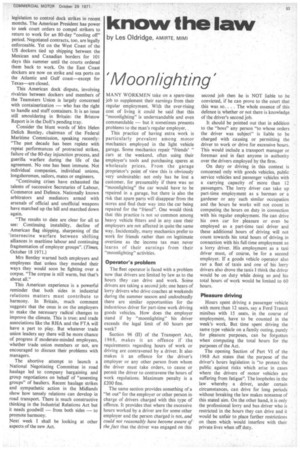know the law
Page 95

If you've noticed an error in this article please click here to report it so we can fix it.
by Les Oldridge, AMIRTE, MIMI
'Moonlighting'
MANY WORKMEN take on a spare-time job to supplement their earnings from their regular employment. With the ever-rising cost of living it could be said that this "moonlighting" is understandable and even commendable — but it sometimes presents problems to the man's regular employer..
This practice of having extra work is particularly prevalent among motor mechanics employed in the light vehicle garage. Some mechanics repair "friends' " cars at the weekend, often using their employer's tools and purchasing spares at wholesale prices. From the garage proprietor's point of view this is obviously very undesirable: not only has he lost a customer, for presumably if there was no "moonlighting" the car would have to be repaired in a garage. but there is also the risk that spare parts will disappear from the stores and find their way into the car being repaired for the "friend". One would think that this practice is not so common among heavy vehicle fitters and in any case their employers are not affected in quite the same way. Incidentally, many mechanics prefer to work for friends rather than on legitimate overtime as the income tax man never learns of their earnings from their "moonlighting" activities.
Operator's problem The fleet operator is faced with a problem now that drivers are limited by law as to the hours they can drive and work. Some drivers are taking a second job; one hears of lorry drivers who drive coaches at weekends during the summer season and undoubtedly there are similar opportunities for the industrious driver for part-time work driving goods vehicles. How does the employer stand if by "moonlighting" his driver exceeds the legal limit of 60 hours per week?
Section 96 (II) of the Transport Act, 1968, makes it an offence if the requirements regarding hours of work or driving are contravened by a driver. It also makes it an offence for the driver's employer or any other person from whom the driver must take orders, to cause or permit the driver to contravene the hours of work regulations. Maximum penalty is a £200 fine.
The same section provides something of a "let out" for the employer or other person in charge of drivers charged with this type of offence. It provides that where the excessive hours worked by a driver are for some other employer and the person charged is not, and could not reasonably have become aware of the fact that the driver was engaged on this second job then he is NOT liable to be convicted, if he can prove to the court that this was so. . . . The whole essence of this defence is whether or not there is knowledge of the driver's second job.
It should be pointed out that in addition to the "boss" any person "to whose orders the driver was subject" is liable to be charged with causing or permitting the driver to work or drive for excessive hours. This would include a transport manager or foreman and in fact anyone in authority over the drivers employed by the firm.
On duty or driving in this context is concerned only with goods vehicles, public service vehicles and passenger vehicles with a carrying capacity of more than 12 passengers. The lorry driver can take up part-time employment as a barman or a gardener or any such similar occupation and the hours he works will not count in computing the hours on duty in Connection with his regular employment. He can drive his own car for pleasure or even be employed as a part-time taxi driver and these additional hours of driving will not count towards his total hours of driving in connection with his full-time employment as a lorry driver. His employment as a taxi driver must, of course, be for a second employer. If a goods vehicle operator also ran a fleet of taxis and one of his lorry drivers also drove the taxis I think the driver would be on duty while doing so and his total hours of work would be limited to 60 hours.
Pleasure driving Hours spent driving a passenger vehicle with more than 12 seats, say a Ford Transit minibus with 15 seats, in the course of employment, have to be counted in the week's work. But time spent driving the same type vehicle on a family outing, purely for pleasure purposes, can be forgotten when computing the total hours for the purposes of the Act.
The opening Section of Part VI of the 1968 Act states that the purpose of the driver's hours legislation is "to protect the public against risks which arise in cases where the drivers of motor vehicles are suffering from fatigue". The loopholes in the law whereby a driver, under certain circumstances, can drive for long periods without breaking the law makes nonsense of this stated aim. On the other hand, it is only the professional lorry and bus driver who is restricted in the hours they can drive and it would be unfair to place further restrictions on them which would interfere with their private lives when off duty.












































































































































